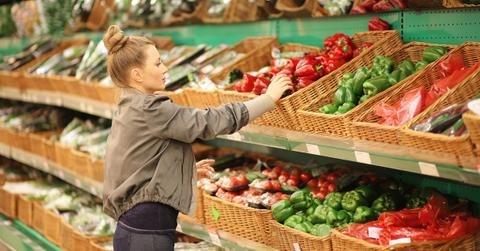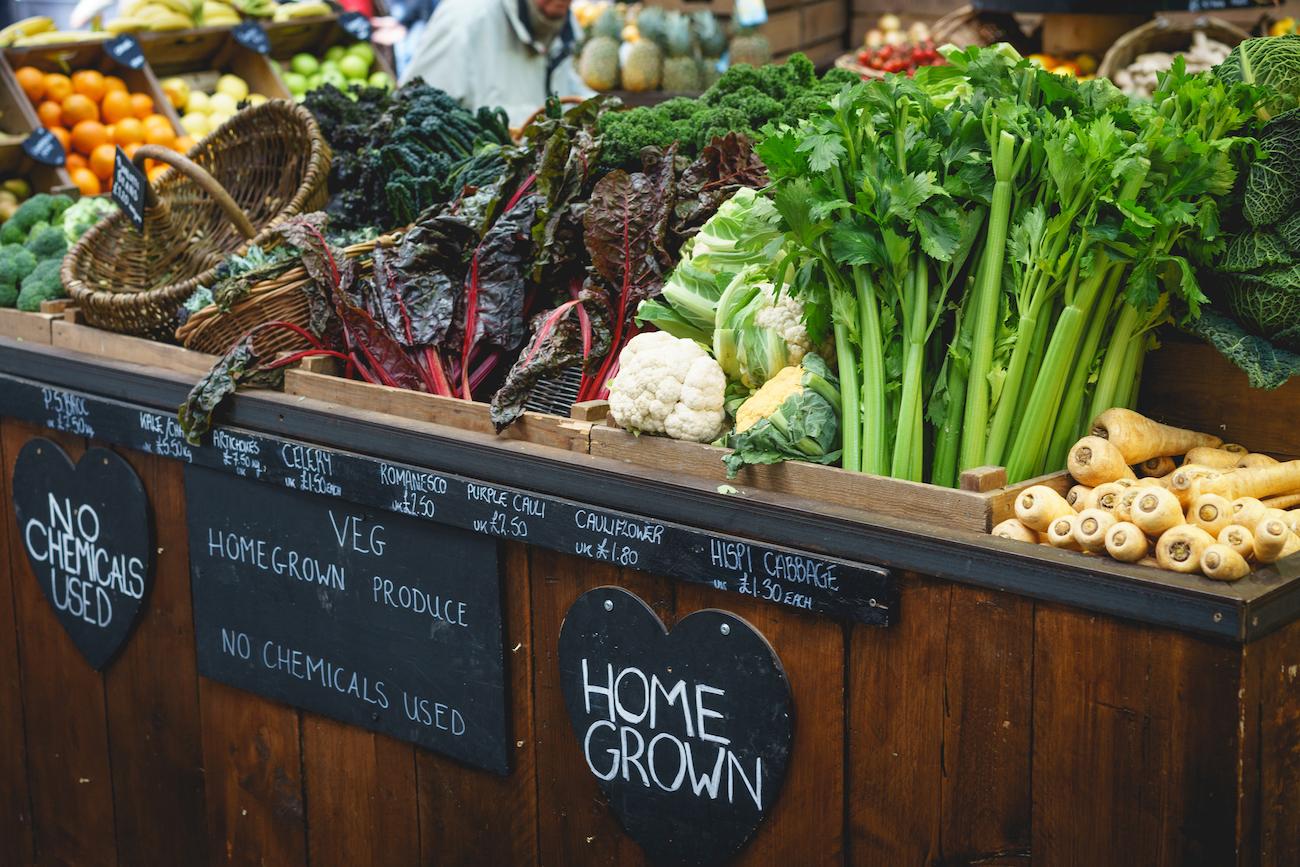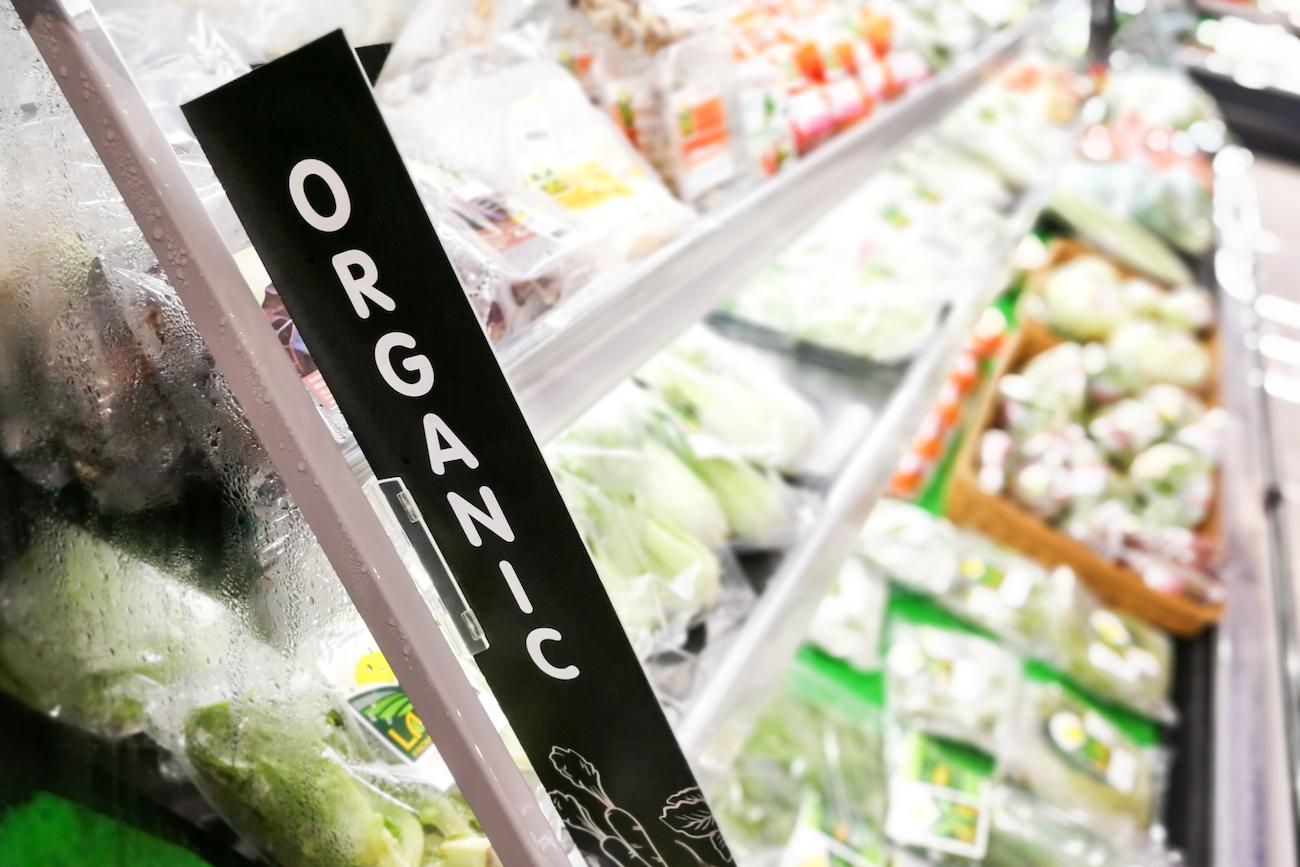Why Is Organic Food More Expensive Than Conventional Food?
Here's everything you need to know.
Updated July 31 2019, 5:07 p.m. ET

Over the past few decades, buying food with an "organic" label has become increasingly popular. While some people try to only eat organic food (since organic food is not treated with pesticides), most people couldn’t care less if their food was organic. Unfortunately for fans of the organic movement, organic food is generally more expensive than conventional food — and that goes for everything from produce to grains to snacks to animal products.
Why Is Organic Food More Expensive?
Organic food often costs more than conventional food. This is not a hard-and-fast rule, but in most cases, an organic apple will cost more than a conventional one.
The higher price of organic food is understandably why many people buy conventional food instead — but in the future, it’s possible that the price of organic food will be about the same as conventional.
In 2017, $45.2 billion of the food industry’s total income was thanks to organic food, according to Capital Press. That number may sound like a lot, but it’s actually only 5.5 percent of the industry’s total sales that year, which were $822.2 billion. So since organic food represents such a small percentage of total food sales, the prices are a bit higher. If the demand for organic food continues to grow, the supply could be scaled up, and organic food could subsequently go down in price (your basic supply and demand).
Another reason organic food costs more is because the production process is more expensive. More labor is required to maintain organic farms than conventional farms, since organic agricultural practices are often more complicated (and take longer) than using pesticides to manage crops, according to the Food and Agriculture Organization of the United Nations (FAO). Additionally, organic farms are more likely to spend time and money protecting their croplands; for example, by practicing crop rotation, which helps build up soil fertility, as per FAO.
Interestingly, it actually costs money to get certified as organic. In the U.S., any food product that is certified organic must be approved by the Department of Agriculture (USDA). According to The Balance Small Business, certification can cost $700 to $1,200 per farm. Not to mention, there are plenty of other responsibilities and costs associated with the certification. As detailed on the USDA’s website, “organic operations must demonstrate that they are protecting natural resources, conserving biodiversity, and using only approved substances.”
All the hoops that farms must jump through to get certified definitely hold some farmers (especially from small, family-run farms) back from applying for the official organic label — even if they maintain their farms using organic practices.
What Exactly Is Organic Food?

Organic food is any food produced without the use of synthetic or chemical pesticides or fertilizers. The organic label can apply to anything from produce (where you probably see it the most) to grains to beans to packaged snacks to animal products.
Interestingly, in terms of meat, dairy, and eggs, organic means the animals were raised on organic land, fed organic food, and not given any antibiotics or growth hormones. However, food made from animals on organic farms still includes hormones, since animals naturally produce hormones just like humans; not to mention, animals on organic factory farms are still subject to the same unethical living conditions and slaughter as animals in conventional factory farms.
The opposite of organic food is called “conventional” food. That term refers to any food that does not restrict the use of those synthetic and chemical ingredients. Trace amounts of pesticides can be detected on a lot of conventional fruits and vegetables, even after being washed.
Is Organic Food Healthier?
In 2009, the NCBI found that in developed nations, the benefits of eating plenty of fresh produce “far outweigh[s] the potential risks from eating very low residues of pesticides in crops.” So if you cannot afford to buy organic produce, don’t let that stop you from eating fruits and vegetables, since conventional food provides the same nutrient profiles as its organic counterparts.
That said, eating conventional produce can slightly increase the risk of developing certain diseases. A 2013 NCBI study found a strong correlation between pesticide exposure and diseases including diabetes, certain cancers, certain neurodegenerative disorders, birth defects, and reproductive disorders.
Is Organic Food Sustainable?

Growing fresh produce for human consumption is pretty much always a sustainable process in the general sense of the word, since nutritious plant foods are necessary to sustain a healthy human population. But when comparing organic versus conventional produce, organic farming practices are generally better for the environment. That’s mainly due to the pesticides used in conventional farming.
Rachel Carson’s 1962 book Silent Spring opened the public’s eyes to just how detrimental pesticides can be for the environment. Pesticides can negatively affect the air, water, soil, nearby plants, animals, and even human health (especially for those who work directly with pesticides).
Additionally, as mentioned above, the USDA requires organic farms to make efforts to protect natural resources and biodiversity, which is obviously a positive thing for the planet.
That said, a 2012 paper by the University of Oxford found that even though organic farming often requires less energy than conventional farming, organic farming requires more land. This increases the environmental impact of organic farming. “People need to realise that an ‘organic’ label is not a straightforward guarantee of the most environmentally-friendly product,” said Hanna Tuomisto, leader of the Oxford research.
In terms of animal products, like meat, eggs, and dairy, it isn’t significantly better for the environment to buy organic products, since the animals still require the same amount of food and produce the same emissions. Factory farming is an unsustainable practice as a whole, so the best way to lower the impact of your diet is not by switching to organic meat, but by eating a plant-based diet.
Is Organic Food Worth It?
Whether or not organic food is worth it depends on the specific food item. Interestingly, certain kinds of foods absorb the pesticides they are treated with more than others. So if you are interested in eating organic, but don’t want to spend your entire paycheck at the grocery store, try following the Dirty Dozen and Clean 15.
What Foods Should I Buy Organic?
The Dirty Dozen is a list of produce that the Environmental Working Group (EWG) found to have the highest concentrations of pesticides (even after being washed), and the Clean 15 is the produce that the EWG found to have the lowest concentrations of pesticides. For that reason, the EWG recommends buying produce from the Dirty Dozen organic whenever possible, and buying conventional versions of the Clean 15.
The EWG updates both lists every year, and in 2019, the “dirtiest” items were strawberries, spinach, and kale (meaning you should buy them organic when possible), and the “cleanest” items were avocados, sweet corn, and pineapples (meaning there’s no need to splurge on organic versions of these items).